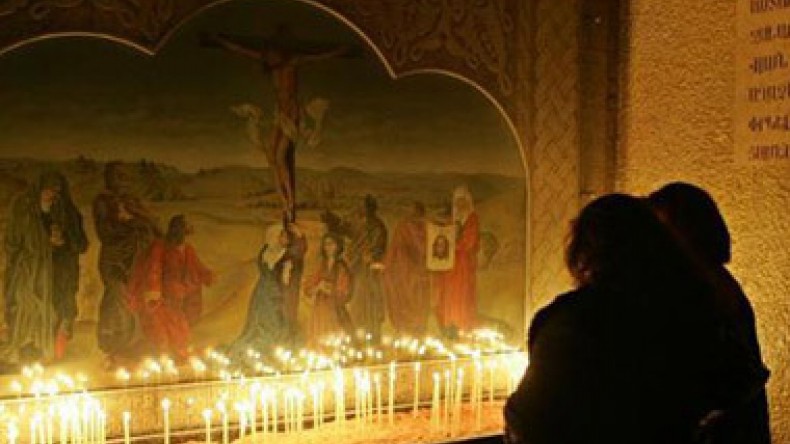
Remaining Armenians pray for peace at Christmas in Damascus
A small congregation of Armenian Orthodox Christians prayed for peace at a Christmas service in Old Damascus on Monday and reflected on the hardships of living in an uneasy middle ground in Syria's increasingly sectarian conflict, Reuters said.
They lamented a low turnout compared to previous years - many have fled Syria and others were unable to get through a maze of checkpoints and traffic bottlenecks to reach the church of St. Sarkis for Armenian Christmas, celebrated on January 6.
"You used to see this entire church courtyard full, but it's been fewer and fewer people every season," said one of the community organizers who, like all those interviewed for this article, asked to remain anonymous due to sensitivities.
"The trouble is many would have liked to come today but they couldn't because of the traffic at checkpoints."
Syria's conflict has grown increasingly sectarian since it started as a peaceful uprising in March 2011 and then evolved into an armed rebellion against President Bashar al-Assad.
Majority Sunni Muslims dominate the uprising while minorities have for the most part stuck with the government, which is dominated by members of Assad's Alawite sect, an offshoot of Shi'ite Islam.
Syria's Christians, around 10 percent, occupy an uneasy middle ground. Some Christians have fled to government-held territory, while others have stayed with the rebels. Some have joined the insurgency.
BETTER DAYS
Archbishop Armash Nalbandian led the mass then delivered a short sermon, with a prayer for better days.
"Last year witnessed many martyrs and kidnappings ... There have been martyrs in our schools ... children aged six and seven killed." he said. "We pray this year for the release of the kidnapped, and for peace in our country, Syria," he said.
An estimated 100,000 Armenians live in Syria, many the descendants of displaced Armenians from the early twentieth century Ottoman wars.
Many of the Armenian Orthodox Christian congregation live in the outlying Damascus district of Jaramana, a densely populated area that is home to many of the city's Christians.
Jaramana has been the site of several car bombs and dozens of mortar and rocket attacks that the government blames on rebels who control the adjacent suburbs. Some rebels blame Christians for sitting on the fence during the uprising.
The community organizer said it took him one and a half hours to arrive from his home in Jaramana to the church, walking most of the way. Two years ago, before the checkpoints, the drive would have taken around 20 minutes.
The church pews snugly fit about 100 congregants but were mostly empty when the service commenced. By the end of the two-hour service about 200 worshippers had shown up, spilling over into the courtyard. Congregants estimated that in 2013 there were twice as many in attendance and in years passed there were hundreds more.
Among the congregants were newly displaced Armenians from Aleppo and elsewhere in Syria. One couple said they escaped dire conditions in Aleppo, where power and water cuts continue for days at a time.
"It took us 52 hours by bus to get here and we slept two nights inside our bus, which was parked inside a garage," said the wife. The journey took about eight hours before the war.
Some Armenians also tried to escape the violence and repatriate to Armenia. But community leaders say many of those who left have come back to Syria.
"We might feel that our origin is Armenia but the country is totally alien to us," said a community elder. "Armenia is a very modern country with lots of big companies. But here? We're used to small family business. It just doesn't work over there, so people came back."
Newsfeed
Videos






























